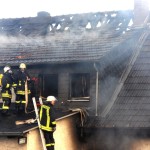Prevent Home Accidents
When it comes to home safety, it is easy to overlook some potential hazards which can cause serious and sometimes fatal accidents. Luckily, some of these can be prevented with simple and relatively cost-effective measures. Take action and prevent these mishaps with these tips.
Alarms
With the surprising number of deaths resulting from fires in homes/buildings with absent or non-functioning smoke alarms (an average of 1450 deaths from 2009-2013), please make sure that you have working smoke alarms on every level of your home (including the attic and the basement).
To ensure that all fires are detected, invest in one which utilizes both a photoelectric sensor for smoldering fires, and an ionization sensor for fast-flaming fires. Those alarms with an ionization sensor should be kept away from the kitchen and baths. Also, invest in interconnected alarms so that if a fire starts in one area of your home, the entire home is alerted.
If your house has a gas dryer, range, other fuel burning equipment, or an attached garage, it is advised to install a carbon monoxide (CO) alarm. These should be present on each living level, as well as in the basement and near the garage (follow manufacturer’s instructions on placement).
Test your alarms at least monthly, and vacuum them to prevent dust from interfering with their sensors every so often. Follow the guidelines on when to replace batteries and the devices themselves based on life expectancy of sensors.
Trips & Falls
Did you know that every year, more than 10,000 people die after falling at home? Even more sustain injuries. We all can be a little clumsy sometimes, but there are ways to prevent these types of accidents in your home.
Make sure that your furniture is arranged in a way that does not disrupt your typical routine (ex. a clear path between your bed and your bedroom door). Keep any pet bowls and electrical cords along the walls rather than across any pathways. Avoid storing piles of paper on the ground, and eliminate any throw rugs as they may skid. If you decide to keep the throw rug, use carpet tacks or double-sided carpet tape to keep it in place. In the bath tub, consider installing a rubber mat or non slip strips and grab bars. Lastly, if you’re remodeling, you may want to choose anti-slip flooring material whenever possible.
Burns
According to the National Safety Council, an estimated 486,000 people were treated for burn injuries (many were children) in the United States in 2011. While lowering the maximum temperature on your water heater to 120°F can help prevent scalds, it also provides an ideal environment for opportunistic bacteria to breed.
Instead, set domestic water heaters to 140°F and employ anti-scald devices at each faucet. For example, thermostatic mixing valves mix hot and cold water to a safe temperature before sending through the faucet. These have become increasingly common in new homes and are often built in to newer fixtures. A licensed plumber can examine your system and install them as needed, or you can save money by installing a single anti-scald valve for your entire house.
Do you have any other home safety tips to share? Connect with us on Facebook, Google+, Twitter, LinkedIn, and Pinterest.
Secure your home with our quality security camera systems today! Browse online at SecurityCamExpert.com or call 888-203-6294 to schedule a site survey or learn more about our products and installation services.
